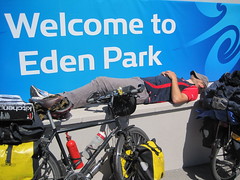newzealand 227
Tom and Jodie posted a photo:

| GEORGIA | PREVIOUS COUNTRY | NEXT COUNTRY | IRAN |
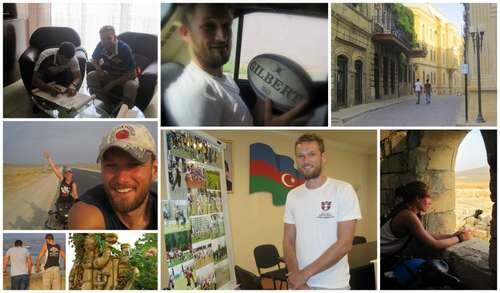
Azerbaijan Rugby Union http://rugby.az/
| Eldegiz Rafibeyli : National Player (Number 8) and President of Azerbaijan Rugby Union | 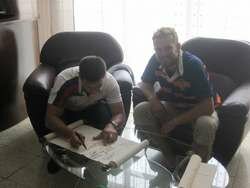 |
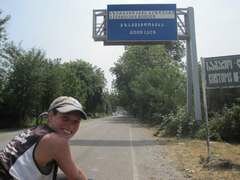 Our time in Georgia was coming to an end, and as we pedalled our last few metres we were presented with an ominous sign above the road, it read “Azerbaijan border – good luck”. Of course this joke was lost in translation to most Georgians, but to us it did little to ease the apprehension of blindly entering another country and culture. It was already midday, and the morning cycle had seemed extraordinarily long, we would only have a few hours to adapt to our new surroundings before seeking a safe place to sleep.
Our time in Georgia was coming to an end, and as we pedalled our last few metres we were presented with an ominous sign above the road, it read “Azerbaijan border – good luck”. Of course this joke was lost in translation to most Georgians, but to us it did little to ease the apprehension of blindly entering another country and culture. It was already midday, and the morning cycle had seemed extraordinarily long, we would only have a few hours to adapt to our new surroundings before seeking a safe place to sleep.
We stepped into Azerbaijan with only a pencil drawing of the country sketched on a scrap of paper, and a single road drawn from the border to the capital “Baku” several hundred kilometres away. It was a nice sketch, but one may suspect that Jodie had spent longer than necessary drawing the waves of the Caspian Sea and mountains of the Caucasian range. It was the sort of map that Frodo would have used when trying to deliver his ring to the fiery volcano. Our preparations had extended to the standard 60 seconds research on Wikipedia and Lonely Planet from Tbilisi.
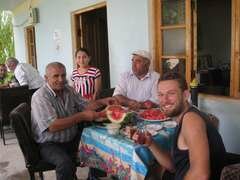 “It is not customary to smile in Azerbaijan, people will consider you either rude, or insane”.
“It is not customary to smile in Azerbaijan, people will consider you either rude, or insane”.
Surely this wasn’t true. It couldn’t be, but to be on the safe side, we had practiced our straight faces over some Georgian homebrew, to limited success. This was probably the only thing on my mind as we stepped foot onto Azeri soil.
With no food, no money and as little facial expression as we could manage, we made our way through the border farmlands to small village with a solitary tree. Beneath were a handful of locals, who invited us to sit with them as we rested from the sun. We tried to thank the first man without smiling but as we approached we saw this might not be necessary. Either this man was rude, or insane, but I think he just wanted an excuse to show off his shiny gold teeth. After 15km we had finally broken a smile and we could now figure out this country for ourselves. It emerged that all the villagers had the same 24 carat dentist and the crackdown on unnecessary smiling in public had been a government initiative to reduce road accidents. We exchanged the last 10 GEL note in the village store, walking away with some bread, melted chocolate, and a handful of Azeri coins for the road. Buoyed with newfound smiley enthusiasm we weaved our way through numerous towns, waving and shouting “Salam” at all the kids. Although Georgia and Azerbaijan had previously been part of the same Soviet Bloc, the architecture and religion had remained independent, Azerbaijan reminding us immediately of our time in Turkey. Ladas with cracked windscreens chugged passed, honking at every opportunity. Many cars slowed and attempted a conversation, the drivers leaning into the passenger seats as they nearly ran us off the road.
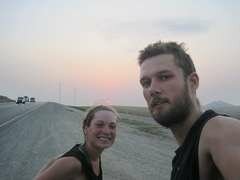 Some roads were surprisingly immaculate with pristine flat tarmac, others bore huge craters, and parts looked as though they had just dropped tarmac over a camel graveyard. Still, our route took us through some of the more attractive regions of northern Azerbaijan, and over one high pass in particular where the top was littered with cafes and çay parks. We rested the bikes for a minute and the cafe workers surrounded us like chimpanzees, prodding and poking at the bikes and everything on them. We sat and drank tea as we went through the usual conversation process; a question asked in Azeri, an answer in English, shrugs from both camps and then laughter from all. It was a simple formula but a tried and tested method for success. They seemed to find most things hilarious so I saw my chance to make my mark on the Azeri comedy scene. One of the most surprising elements to our trip has been the inability to pronounce the name “Jodie”. So much so, that she has adopted several local versions of the name enroute; “JoJee, Gugee, Guly, Jada” the list goes on. When introducing our names this time, I presented myself as “Tom”.
Some roads were surprisingly immaculate with pristine flat tarmac, others bore huge craters, and parts looked as though they had just dropped tarmac over a camel graveyard. Still, our route took us through some of the more attractive regions of northern Azerbaijan, and over one high pass in particular where the top was littered with cafes and çay parks. We rested the bikes for a minute and the cafe workers surrounded us like chimpanzees, prodding and poking at the bikes and everything on them. We sat and drank tea as we went through the usual conversation process; a question asked in Azeri, an answer in English, shrugs from both camps and then laughter from all. It was a simple formula but a tried and tested method for success. They seemed to find most things hilarious so I saw my chance to make my mark on the Azeri comedy scene. One of the most surprising elements to our trip has been the inability to pronounce the name “Jodie”. So much so, that she has adopted several local versions of the name enroute; “JoJee, Gugee, Guly, Jada” the list goes on. When introducing our names this time, I presented myself as “Tom”.
“Ah ‘Tom’” they would say in unison, pausing to absorb this information.
“And this” I said, as I pointed to my little cycling companion, “is Jerry”.
“Jerry” they replied together. Yet another pause, but this one busy with ticking minds. There was something familiar about these names, maybe there was a joke in there? A few seconds later and the penny dropped.
“Tom and Jerry” they roared. This was the funniest thing ever to happen on the mountain. They laughed and laughed. They had realised that this was not her real name but were too busy enjoying the moment to dig any further, I had cracked the market. Sadly my comedy career was cut short, and I was soon outperformed by the teapot bell on Jodie’s bike.
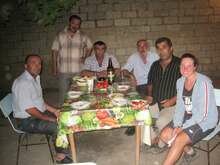
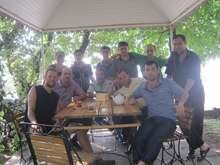
Cycling through the country to Baku wasn’t all tea and polite conversation. Jodie received more than enough unwanted attention from local men and asked me to keep my toilet breaks to the bare minimum at petrol stations. If she had seen these toilets she would have understood that my breaks were already kept to a bare minimum, but she had good reason. If I was out of earshot, boys and men of all ages would ask her if she was married. She would reply “yes”, to which they would look her up and down, make kissing actions, then ask for her telephone number. It was all a bit confusing. Most people were very hospitable, but there were several towns enroute where the locals would probably consider Baboo as Einstein. Some shouted, others whistled to get our attention, one man literally just stood in the road and stared as we cycled before howling. It was very “Shaun of the Dead” and so we amused ourselves frequently by singing “ghost town” as we passed through. We completed the final 80km stretch of desert in the late hours of evening and early hours of the following morning, and upon arriving in Baku had pedalled 650km in 5.5 days.
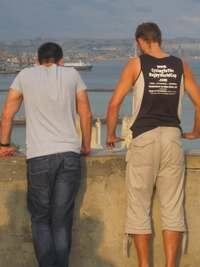 We made contact with our host, Eldegiz Rafibeyli, who is the president of the Azerbaijan Rugby Union, and still the national team’s number 8. Despite not finding the designated meeting point, he came and met us immediately, introducing himself in what was a suspiciously strong Scottish accent. He was keen to make us comfortable after what had been a reasonably big cycle and led the way through the backstreets in his Lada. We followed on bikes and were soon at one of the sports hotels in the city. Once unpacked he treated us to lunch and we joined by the national team hooker, and the rugby development manager.
We made contact with our host, Eldegiz Rafibeyli, who is the president of the Azerbaijan Rugby Union, and still the national team’s number 8. Despite not finding the designated meeting point, he came and met us immediately, introducing himself in what was a suspiciously strong Scottish accent. He was keen to make us comfortable after what had been a reasonably big cycle and led the way through the backstreets in his Lada. We followed on bikes and were soon at one of the sports hotels in the city. Once unpacked he treated us to lunch and we joined by the national team hooker, and the rugby development manager.
“Has anyone ever told you that you sound a little Scottish?” I asked
“Yes” he replied.
I had hoped for a continuation to this story but it didn’t appear forthcoming.
“Have you been to Scotland then?” I delved a little deeper.
“No” he said, like Sean Connery, “but at BP many of the expats I work with are Scottish”
Thankfully this has had no effect on the rugby in Baku.
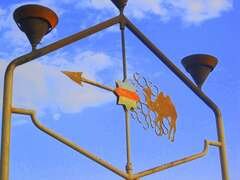 As one of the original national players, and the new president, there was no better insight into the country’s rugby activities. He gave us an overview of the history of the sport here which shed some light into some of the e-mail correspondence we had previously had. He had referred to Azerbaijan rugby as “fairly young” in e-mails and that he was part of the “3rd generation of players”. I had understood this as a 15-20 year history where 2 sets of players had played and retired, but this wasn’t the case. He was quite literally the 3rd generation of players to be playing the sport in Azerbaijan (the” land of fire”). Rugby had amusingly first come to the country in the 1930s when a group of British sailors had organised some matches amongst themselves. Anyone with a map of the world will see the comedy of British sailors finding themselves in the Caspian Sea. Again rugby emerged in the 1960s but the sport again didn’t catch on.
As one of the original national players, and the new president, there was no better insight into the country’s rugby activities. He gave us an overview of the history of the sport here which shed some light into some of the e-mail correspondence we had previously had. He had referred to Azerbaijan rugby as “fairly young” in e-mails and that he was part of the “3rd generation of players”. I had understood this as a 15-20 year history where 2 sets of players had played and retired, but this wasn’t the case. He was quite literally the 3rd generation of players to be playing the sport in Azerbaijan (the” land of fire”). Rugby had amusingly first come to the country in the 1930s when a group of British sailors had organised some matches amongst themselves. Anyone with a map of the world will see the comedy of British sailors finding themselves in the Caspian Sea. Again rugby emerged in the 1960s but the sport again didn’t catch on.
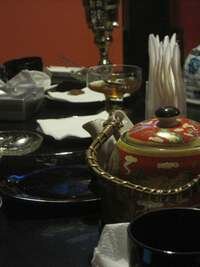 The foundations for a 3rd generation of players were laid by 2 rugby expats, Robert Lambert (a Scot), and Peter Van Der Groen (Dutch). They organised some training sessions and matches in Baku involving both expats and locals. Eldegiz had recently returned from a short spell studying in Oklahoma, USA, when a friend invited him down to play. It was early days and his friend had said they were throwing around a funny shaped ball, and that he thought it was American Football. Eldegiz quickly realised that this was nothing like the sport he had seen during his studies, but looked into it and was quickly hooked. In 2000, they had collected about 40-50 guys for training and in 2001 had laid the foundations for Baku RC. Through Eldegiz’s father, who had a consultancy firm, they set about registering the club officially through the various government ministries and by 2003 the lengthy paperwork process was completed. Rugby was now an official sport in Azerbaijan. Although there was no other registered clubs, they organised a rugby 7s tournament in 2003, inviting Georgian teams and running a junior and women’s competition too.
The foundations for a 3rd generation of players were laid by 2 rugby expats, Robert Lambert (a Scot), and Peter Van Der Groen (Dutch). They organised some training sessions and matches in Baku involving both expats and locals. Eldegiz had recently returned from a short spell studying in Oklahoma, USA, when a friend invited him down to play. It was early days and his friend had said they were throwing around a funny shaped ball, and that he thought it was American Football. Eldegiz quickly realised that this was nothing like the sport he had seen during his studies, but looked into it and was quickly hooked. In 2000, they had collected about 40-50 guys for training and in 2001 had laid the foundations for Baku RC. Through Eldegiz’s father, who had a consultancy firm, they set about registering the club officially through the various government ministries and by 2003 the lengthy paperwork process was completed. Rugby was now an official sport in Azerbaijan. Although there was no other registered clubs, they organised a rugby 7s tournament in 2003, inviting Georgian teams and running a junior and women’s competition too.
Eldegiz, the original founders, and other players began work on a rugby federation. In 2004, they began satisfying the criteria and registered 3 further teams; Baku Exiles (a team of expats), TISA Titans (The International School of Azerbaijan), and a team for young players. In 2005 the federation was officially recognised by FIRA and the IRB, and they were entered into the European League 3C. Eldegiz captained his national team to the first international fixture, away to Bosnia on 15th April 2005. They lost respectfully 34-17, and later won the return fixture in Baku 11-8.
To date, there has been little international success, and they were later relegated to a new FIRA league 3D. Originally this was comprised of 5 teams, but apparently Monaco had financial problems and had to withdraw. When the champions, Cyprus, were promoted to 3C with no relegation to 3D, the league has been left with only 3 teams, Azerbaijan, Bosnia and Slovakia. This year’s tri-nations competition will occur in Bosnia at the end of October. I understand that some, if not all tickets are still available.
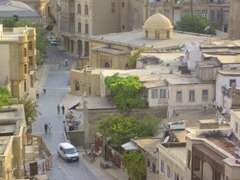 Baku is not typical of Azerbaijan, despite around 90% of the countries’ population living there. It is as modern as any city on our trip, but they have simultaneously preserved the ‘old town’ and much of the architecture. The business is built on oil, and everything that comes with it. Luxury hotels and boutique jewellers line the Caspian Sea Boulevard amidst the rows of designer clothes stores and restaurants. Despite being a city built upon vast wealth, funds for the rugby federation are hard to come by. Business in Azerbaijan is shrewd, and money is not invested without return. Sadly this doesn’t just affect the national team. Eldegiz and his squad are of the most hospitable and amicable people we have met on our trip. They play the sport purely for love of the game, but they don’t stop on the pitch. For many years now, they have worked with 3 local orphanages to bring rugby into the children’s lives. They have presented these children with a new opportunity at family and it has seen positive results. When children on the street can’t afford to travel to training, the players and the union will ensure they have the money to continue playing. These children are the first genuine youth to receive rugby coaching (the orphanage coach is Vagif Saadatkhan who was a scrum half from the “BAKU – 2nd generation” 1960s) and it is the belief that some of the promising players will soon be representing their country at rugby. This is a fantastic story, but as usual, there is a lack of funds available to source equipment, organise proper coaching, and very few areas of grass that can be accessed for rugby activities.
Baku is not typical of Azerbaijan, despite around 90% of the countries’ population living there. It is as modern as any city on our trip, but they have simultaneously preserved the ‘old town’ and much of the architecture. The business is built on oil, and everything that comes with it. Luxury hotels and boutique jewellers line the Caspian Sea Boulevard amidst the rows of designer clothes stores and restaurants. Despite being a city built upon vast wealth, funds for the rugby federation are hard to come by. Business in Azerbaijan is shrewd, and money is not invested without return. Sadly this doesn’t just affect the national team. Eldegiz and his squad are of the most hospitable and amicable people we have met on our trip. They play the sport purely for love of the game, but they don’t stop on the pitch. For many years now, they have worked with 3 local orphanages to bring rugby into the children’s lives. They have presented these children with a new opportunity at family and it has seen positive results. When children on the street can’t afford to travel to training, the players and the union will ensure they have the money to continue playing. These children are the first genuine youth to receive rugby coaching (the orphanage coach is Vagif Saadatkhan who was a scrum half from the “BAKU – 2nd generation” 1960s) and it is the belief that some of the promising players will soon be representing their country at rugby. This is a fantastic story, but as usual, there is a lack of funds available to source equipment, organise proper coaching, and very few areas of grass that can be accessed for rugby activities.
Having recently turned 30 years old, Eldegiz is the youngest rugby president we have met on our trip, perhaps even in the world. He has time on his side to lay the foundations for the future of rugby and his committee are now preparing a 5 year plan. This will incorporate plans to introduce rugby into schools and universities, further the projects for the orphanages and bring in some commercial interest to the sport through sponsorship. It is a tough task, but with such a great group of individuals I believe that the “4th Generation” of Azeri players will be here very soon.
We wish all the Azeri boys the best of luck in Bosnia and we’ll be keeping you all posted with the projects surrounding the orphanages. If you are interested in contributing equipment or anything to this cause please e-mail us
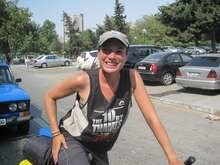
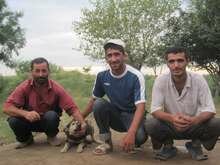
| GEORGIA | PREVIOUS COUNTRY | NEXT COUNTRY | IRAN |
Tom and Jodie posted a photo:

Tom and Jodie posted a photo:
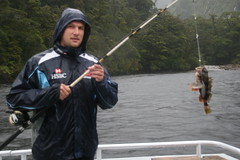
Tom and Jodie posted a photo:
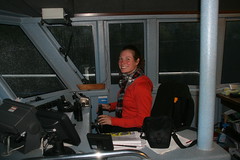
Tom and Jodie posted a photo:
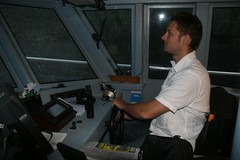
Tom and Jodie posted a photo:
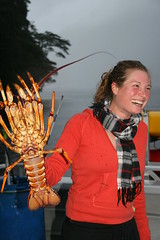
Tom and Jodie posted a photo:
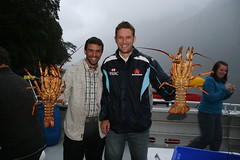
Tom and Jodie posted a photo:
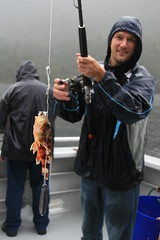
Tom and Jodie posted a photo:
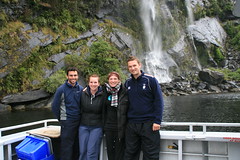
Tom and Jodie posted a photo:
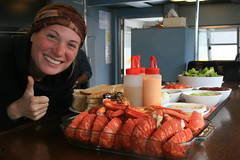
Tom and Jodie posted a photo:
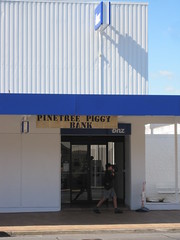
Tom and Jodie posted a photo:
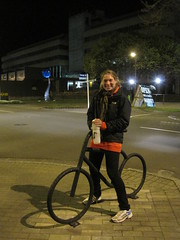
Tom and Jodie posted a photo:
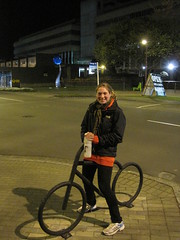
Tom and Jodie posted a photo:
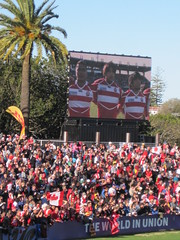
Tom and Jodie posted a photo:
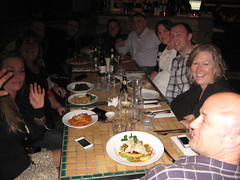
Tom and Jodie posted a photo:
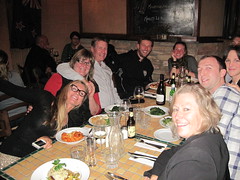
Tom and Jodie posted a photo:
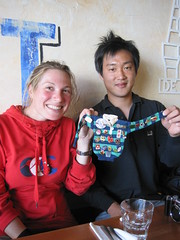
Tom and Jodie posted a photo:
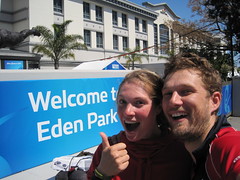
Tom and Jodie posted a photo:
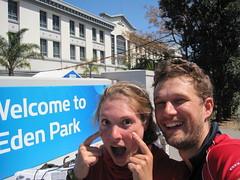
Tom and Jodie posted a photo:
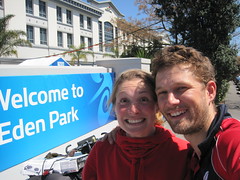
Tom and Jodie posted a photo:
